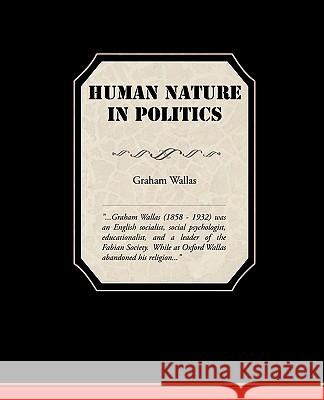Human Nature In Politics » książka
Human Nature In Politics
ISBN-13: 9781438535449 / Angielski / Miękka / 2010 / 192 str.
Human Nature In Politics
ISBN-13: 9781438535449 / Angielski / Miękka / 2010 / 192 str.
(netto: 86,11 VAT: 5%)
Najniższa cena z 30 dni: 89,19
ok. 16-18 dni roboczych.
Darmowa dostawa!
Graham Wallas (1858 - 1932) was an English socialist, social psychologist, educationalist, and a leader of the Fabian Society. While at Oxford Wallas abandoned his religion. His works include Property Under Socialism (1889), Human Nature in Politics (1908), The Great Society (1914), Our Social Heritage (1921), and The Art of Thought (1926). An excerpt reads from Human Nature in Politics reads, "Any examination of human nature in politics must begin with an attempt to overcome that 'intellectualism' which results both from the traditions of political science and from the mental habits of ordinary men. Political impulses are not mere intellectual inferences from calculations of means and ends; but tendencies prior to, though modified by, the thought and experience of individual human beings. This may be seen if we watch the action in politics of such impulses as personal affection, fear, ridicule, the desire of property, etc. All our impulses and instincts are greatly increased in their immediate effectiveness if they are 'pure, ' and in their more permanent results if they are 'first hand' and are connected with the earlier stages of our evolution. In modern politics the emotional stimulus which reaches us through the newspapers is generally 'pure, ' but 'second hand, ' and therefore is both facile and transient. The frequent repetition of an emotion or impulse is often distressing. Politicians, like advertisers, must allow for this fact, which again is connected with that combination of the need of privacy with intolerance of solitude to which we have to adjust our social arrangements."
Graham Wallas (1858 - 1932) was an English socialist, social psychologist, educationalist, and a leader of the Fabian Society. While at Oxford Wallas abandoned his religion. His works include Property Under Socialism (1889), Human Nature in Politics (1908), The Great Society (1914), Our Social Heritage (1921), and The Art of Thought (1926). An excerpt reads from Human Nature in Politics reads, "Any examination of human nature in politics must begin with an attempt to overcome that intellectualism which results both from the traditions of political science and from the mental habits of ordinary men. Political impulses are not mere intellectual inferences from calculations of means and ends; but tendencies prior to, though modified by, the thought and experience of individual human beings. This may be seen if we watch the action in politics of such impulses as personal affection, fear, ridicule, the desire of property, etc. All our impulses and instincts are greatly increased in their immediate effectiveness if they are pure, and in their more permanent results if they are first hand and are connected with the earlier stages of our evolution. In modern politics the emotional stimulus which reaches us through the newspapers is generally pure, but second hand, and therefore is both facile and transient. The frequent repetition of an emotion or impulse is often distressing. Politicians, like advertisers, must allow for this fact, which again is connected with that combination of the need of privacy with intolerance of solitude to which we have to adjust our social arrangements."











